Related Research Articles

The Turkmenistan–Afghanistan–Pakistan–India (TAPI) Pipeline, also known as Trans-Afghanistan Pipeline, is a natural gas pipeline being developed by the Galkynysh – TAPI Pipeline Company Limited with participation of the Asian Development Bank. The pipeline will transport natural gas from the Galkynysh Gas Field in Turkmenistan through Afghanistan into Pakistan and then to India. Construction on the project started in Turkmenistan on 13 December 2015, work on the Afghan section began in February 2018, and work on the Pakistani section was planned to commence in December 2018. The abbreviation TAPI comes from the first letters of those countries. Proponents of the project see it as a modern continuation of the Silk Road.

The Economic Cooperation Organization or ECO is an Asian political and economic intergovernmental organization that was founded in 1985 in Tehran by the leaders of Iran, Pakistan, and Turkey. It provides a platform to discuss ways to improve development and promote trade and investment opportunities. The ECO is an ad hoc organisation under the United Nations Charter. The objective is to establish a single market for goods and services, much like the European Union. After the dissolution of the Soviet Union, the ECO expanded to include Afghanistan, Azerbaijan, Kazakhstan, Kyrgyzstan, Tajikistan, Turkmenistan, and Uzbekistan in 1992.
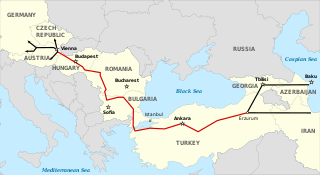
The Nabucco pipeline was a failed natural gas pipeline project from Erzurum, Turkey to Baumgarten an der March, Austria to diversify natural gas suppliers and delivery routes for Europe. The pipeline was to lessen European dependence on Russian energy. The project was backed by several European Union states and the United States and was seen as rival to the Gazprom-Eni South Stream pipeline project. The main supplier was to be Iraq with potential supplies from Azerbaijan, Turkmenistan, and Egypt.
The Iran–Pakistan gas pipeline, also known as the Peace pipeline, or IP Gas, is an under-construction 2,775-kilometre (1,724 mi) pipeline to deliver natural gas from Iran to Pakistan.

The Republic of Azerbaijan and the European Union (EU) have maintained a positive relationship through the years and have become more closely linked since 1991. Azerbaijan is currently part of the European Neighborhood Policy, the Eastern Partnership and the Council of Europe. The EU is the largest foreign grant donor to and investor in Azerbaijan, both in the government sector and civil society, making available over 600 million EURO of bilateral EU assistance since 1992.

Russia has an embassy in Algiers and a consulate in Annaba, and Algeria has an embassy in Moscow. Algeria currently enjoys very strong relations with Russia.
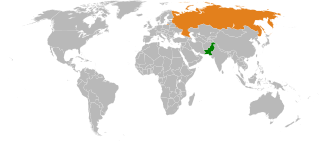
The Soviet Union and Pakistan first established the diplomatic and bilateral relations on 1 May 1948.

Republic of the Congo–Russia relations refers to bilateral foreign relations between the Republic of the Congo and Russia. The Republic of the Congo has an embassy in Moscow. Russia has an embassy in Brazzaville.

Russia–Tunisia relations (Arabic: العلاقات التونسية الروسية) are foreign relations between Russia and Tunisia. Both countries had established diplomatic relations in 1956, when Tunisia got its independence. Russia has an embassy in Tunis, and Tunisia has an embassy in Moscow.
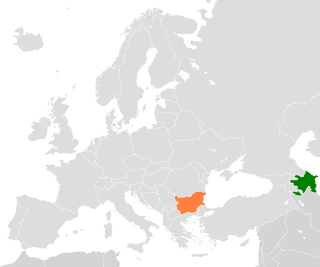
Bilateral relations exist between the Republic of Azerbaijan and the Republic of Bulgaria in political, socio-economic, cultural and other spheres. Cooperation is carried out in such areas as transport and transit of goods, tourism, pharmaceuticals, agriculture, science and high technologies, education, military equipment, etc.
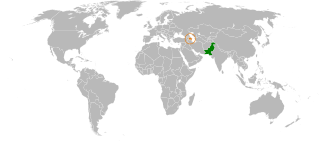
Azerbaijan–Pakistan relations refer to bilaterial relations between the Republic of Azerbaijan and the Islamic Republic of Pakistan. Pakistan has an embassy in Baku and Azerbaijan has an embassy in Islamabad. Both countries are enhancing contact between their respective capitals. The two nations are considered "strategic partners".

Bilateral relations exist between the Republic of Azerbaijan and Japan in the political, socio-economic, cultural, and other fields.

European Union–Kazakhstan relations are the international relations between the Republic of Kazakhstan and the common foreign policy and trade relations of the European Union.

China–Russia relations, are the international relations between the People's Republic of China and the Russian Federation. Diplomatic relations between China and Russia improved after the dissolution of the Soviet Union and establishment of the Russian Federation in 1991. American scholar Joseph Nye states:
With the collapse of the Soviet Union, that de facto US-China alliance ended, and a China–Russia rapprochement began. In 1992, the two countries declared that they were pursuing a "constructive partnership"; in 1996, they progressed toward a "strategic partnership"; and in 2001, they signed a treaty of "friendship and cooperation."

Iran and South Korea have had diplomatic relations since 1962. Throughout history, the two countries have maintained a normal relationship despite South Korea's close relationship with the United States, and Iran's close relationship with North Korea. However, many South Koreans disapprove of Iran's nuclear program and its open alliance with North Korea, sometimes leading the South Korean government to sanction Iran.
TurkStream is a natural gas pipeline running from Russia to Turkey. It starts from Russkaya compressor station near Anapa in Russia's Krasnodar Region, crossing the Black Sea to the receiving terminal at Kıyıköy.

Azerbaijan-India relations are the bilateral relations that exist between the Republic of Azerbaijan and the Republic of India.

Diplomatic relations between the Republic of Azerbaijan and the People's Republic of China were established on April 2, 1992. The relations between the two countries have developed smoothly and high-level exchanges have been close. The PRC embassy in Baku openly commends Azerbaijan for supporting its stance on the political status of Taiwan, Tibet's sovereignty, the conflict in Xinjiang, and the suppression of Falun Gong. All political forces have actively advocated strengthening friendly cooperation with China. China was one of the first countries to recognize independence. President Aliyev came to China in August 2008 and May 2014 to attend the opening ceremony of the Beijing Olympic Games and the fourth summit of the Asia Cooperation and Confidence Measures Conference. In March 2005 and December 2015, he twice went to China for state affairs. access. In June 2018, the President of the National Assembly, Assador, visited China. In May 2016, Special Envoy of Chinese Communist Party (CCP) general secretary Xi Jinping, member of the Political Bureau of the CCP Central Committee and Secretary of the CCP Central Political and Legal Affairs Commission Meng Jianzhu visited Afghanistan. In June of the same year, Zhang Gaoli, member of the Standing Committee of the Political Bureau of the CCP Central Committee and Vice Premier of the State Council, visited Azerbaijan.
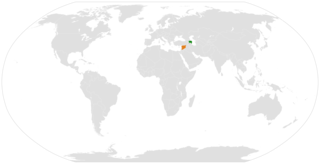
Azerbaijan–Syria relations refer to the bilateral relations between the Republic of Azerbaijan and the Syrian Arab Republic in political, socio-economic, cultural and other spheres.
References
- ↑ "8th meeting of Pakistan-Russian Intergovernmental Commission starts". The Nation. January 19, 2023.
- ↑ "Pakistan-Russia Intergovernmental Commission meeting underway in Islamabad". www.radio.gov.pk.
- ↑ "Pakistan, Russia sign agreement for construction of North-South gas pipeline". DAWN.COM. October 16, 2015.
- ↑ "North-South pipeline: Pakistan, Russia reach LNG price accord". The Express Tribune. November 30, 2016.
- ↑ https://www.isas.nus.edu.sg/papers/russia-pakistan-economic-relations-energy-partnership-and-the-china-factor/